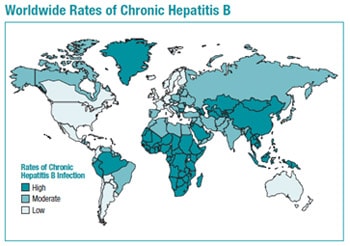Every year on July 28th, World Hepatitis Day
aims to increase the awareness and understanding of viral hepatitis as a
major global health threat.
All types of viral hepatitis can cause
inflammation of the liver; however, hepatitis B and C infection can
result in a lifelong, chronic infection.
The World Health Organization (WHO) estimates that
nearly 400 million people have chronic viral hepatitis worldwide and
most of them do not know they are infected.
More than 1 million people
die each year from causes related to viral hepatitis, commonly
cirrhosis and liver cancer.
The date of July 28th was chosen for World Hepatitis
Day in honor of the birthday of Nobel Laureate Professor Baruch Samuel
Blumberg, who discovered the hepatitis B virus.
.......................................
Hepatitis A
.......................................
- Hepatitis A is a liver disease caused by the hepatitis A virus that can cause mild to severe illness but does not lead to chronic infection.
- Globally, there are an estimated 1.4 million cases of hepatitis A every year.
- The hepatitis A virus is spread by ingestion of contaminated food and water, or through direct contact with an infectious person.
Hepatitis A is a virus that is usually spread through
food or water contaminated with fecal matter—even in microscopic
amounts.
This occurs most often in countries where Hepatitis A is
common, especially where there is a lack of safe water and poor
sanitation.
Although rare, foodborne outbreaks of Hepatitis A
still occur in the United States.
Contamination of food can happen at
any point: growing, harvesting, processing, handling, and even after
cooking.
The best way to prevent getting infected with Hepatitis A is
to get a safe, effective vaccine.
In the United States, the Hepatitis A
vaccine is recommended for all children at age 1 and adults at risk of
infection.
.......................................
Hepatitis B
......................................
- Hepatitis B is a serious liver disease caused by the hepatitis B virus that can cause both acute and chronic disease.
- Globally, there are an estimated 240 million people living with chronic Hepatitis B.
- The hepatitis B virus is spread through contact with the blood or other body fluids of an infected person.
The best way to prevent getting infected with
Hepatitis B is to get vaccinated.
In the United States, the Hepatitis B
vaccine is recommended for all babies at birth and adults at risk of
infection.
Hepatitis B is common in many areas across the
world, especially Asian and African countries.
Left untreated, up to 25
percent of people with hepatitis B develop serious liver problems such
as cirrhosis and even liver cancer.
The good news is that treatments
are available that can help slow down or prevent liver damage.

CDC launched Know Hepatitis B,a
national, multilingual campaign aiming to increase testing for
Hepatitis B among Asian Americans and Pacific Islanders (AAPIs) in
2013.
An estimated 1 in 12 AAPI is living with hepatitis B, but most
don't know they are infected.
The campaign delivers culturally relevant
messages in English, Chinese, Korean and Vietnamese.
The Know
Hepatitis B campaign was created in partnership with Hep B United , a coalition of Asian community groups from around the country.
, a coalition of Asian community groups from around the country.
Visit www.cdc.gov/knowhepatitisb for more information.
.......................................
Hepatitis C
......................................
- Hepatitis C is a serious liver disease caused by the hepatitis C virus that can cause both acute and chronic disease.
- Globally, there are an estimated 130–150 million people living with chronic Hepatitis C.
- The hepatitis C virus is a bloodborne virus.
- There is currently no vaccine for hepatitis C.
Unlike Hepatitis A and Hepatitis B, there is no vaccine available
to prevent Hepatitis C.
The best way to prevent Hepatitis C is by
avoiding behaviors that can spread the disease, such as sharing needles
or other equipment to prepare and inject cosmetic substances, drugs,
or steroids.
In addition to recommending testing for anyone at risk for
infection, CDC also recommends that everyone born from 1945-1965 get a
blood test for hepatitis C.
People born during these years are five
times more likely to be infected and account for more than three out of
every four Americans living with hepatitis C.
CDC's national Know More Hepatitis campaign educates people born from 1945-1965 about the importance of getting tested.
People with Hepatitis C often have no symptoms and can live with the
disease for decades without feeling sick.
Even without symptoms, liver
damage may be silently occurring. Fortunately, new treatments are
available that can cure Hepatitis C.
Do you need to be tested or vaccinated?
.......................................
Find out if you should get tested or vaccinated by taking CDC's 5 minute online Hepatitis Risk Assessment.
......................................
More Information
......................................
- CDC Viral Hepatitis webpage
- World Health Organization (WHO) – World Hepatitis Day

- World Hepatitis Alliance – World Hepatitis Day

- WHO Global Policy Report on the Prevention and Control of Viral Hepatitis

- Presidential Proclamation 2011-World Hepatitis Day

- AIDS.gov World Hepatitis Day webpage

- Follow @CDChep
 on Twitter for information about #WorldHepatitisDay
on Twitter for information about #WorldHepatitisDay - Get viral hepatitis email updates from CDC through GovDelivery

